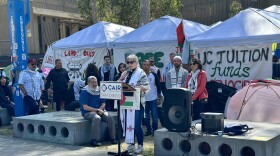GLORIA PENNER (Host): This week, a major shake-up in Washington. President Obama relieved General Stanley McChrystal as top commander of the war in Afghanistan and named General David Petraeus as his replacement. A Rolling Stone magazine article documenting McChrystal scathing remarks about the president apparently set the ouster in motion. With us is Tony Perry, the San Diego Bureau chief for the L.A. Times was embedded with the Marines in Iraq and Afghanistan during the course of the war. Tony, what did McChrystal say that made the president fire him and lose confidence in him?
TONY PERRY (Los Angeles Times): McChrystal and a number of his aides had small, sophomoric, snarky things to say. They talked about the wimps in the White House, and referred to the vice president as "Joe Bite-Me," and called General Jones, the national security advisor, a clown. Sophomoric stuff like that. But the sum of it was, that it brought into question, in the commander in chief's mind, his judgment, and he lost confidence in him, and he relieved him.
PENNER: So, San Diego does have a significant stake in this war. What could the removal of General McChrystal have on our local military community?
PERRY: Not a single thing.
PENNER: Really?
PERRY: We have 10,000 Marines from Camp Pendleton in Afghanistan, and each one of them got up the day after McChrystal was relieved, and went out and did their duty as they do it at 110%. It just doesn't work that way, these are dedicated young men and women, they do their jobs, and they're going to push this mission just as hard and fast as they can. And I'm sure the same is true of the Army troops. The top man has more to do with maintaining the confidence in Washington, maintaining the confidence of the American public. That's why the selection of Petraeus is seen as a smart one. He's able to do both. He's got the respect of the troops, but also respect in Washington, and the population in America.
PENNER: So I'm going to press you a little bit more on this. So, no Marines, no soldiers, are saying anything to you about this story?
PERRY: Not the Marines. He's an Army general, so the Marines probably have an undifferentiated view of Army generals -- one or the other doesn't make a difference. I'm sure he has his followers who are very upset that he has been relieved. But they're professionals, want to go out and do their job. On the other hand, he probably has his critics too. They'll go out and maybe be even more enthused. So a net sum of zero. And Petraeus has his followers, and he's a good leader, he'll get out and about, he'll make himself known, he'll follow the same game plan that McChrystal had, the counter-insurgency plan, tweak it a bit, I'm sure, as events dictate, but no great wrench. A change in personality, or personnel, but not policy as the president said.
PENNER: In terms of Petraeus, but troops are taught not to challenge their leaders, and not to undermine the chain of command. And one would think that you know hey this happened at the top. It must make a difference.
PERRY: It must in some ways, yes, they're told speak when spoken to, you can vent your views when asked, but don't go out and spread dissension and don't talk to the press in a trashy sort of way.
PENNER: Yeah, that's probably it. What access the writer had to the general?
PERRY: Extraordinary. They bumped into each other in an airport lounge, apparently, in Europe. They were grounded because of the Iceland volcano ash. They had a lot of time together, and got palsy-walsy, and they continued back to Afghanistan -- with the result we now know.
PENNER: Let's talk a little bit more about strategy. The president has been talking about starting to withdraw the troops from Afghanistan in July. And you know there was some hesitation as to whether that's such a great idea. Is General Petraeus really on board on that one?
PERRY: Well he testified just, what, about a week ago, and he is on board to this extent -- that it's a target, and it will be events-based, reality on the ground. Now, he will have to give a report to the White House come December. How is it going? Can we still start to withdraw in July 2011. That may be the next flashpoint, when the leaders there, Petraeus and the others, have to tell the White House, and the vice president -- who we know did not believe in sending additional troops -- they have to tell them, "Is it working, can we still abide by your target date?" If the answer is no, and we start having push-pull between the White House and generals on the ground, it's really going to hit the fan.
PENNER: So how do we measure success in Afghanistan, and what needs to be accomplished before we start withdrawing troops?
PERRY: Exceedingly difficult. One way you DON'T measure it particularly well is body counts. There is no worse way to decide who's winning and who's losing than how many people are dying. Now it'd be a wonderful way to decide "Is it worth it? Should we be burying these U.S. casualties at this level? Is it worth it?" That's a political question. But "who's winning" can not really be determined by body count. We learned that in Vietnam. Afghanistan is particularly difficult to gauge, given the terrain, given the size, given how split up this country is into tribes and regions, and how volatile it is -- an exceedingly difficult situation to assess. As one general said, "I don't really know success until I see it; when I see it, I'll let you know."
PENNER: Doesn't sound very scientific. But thank you very much, Tony Perry.
PERRY: My pleasure.








